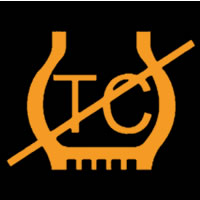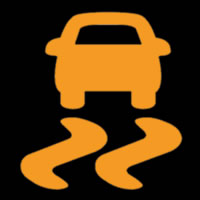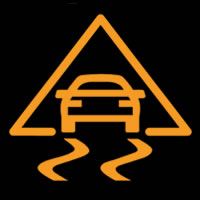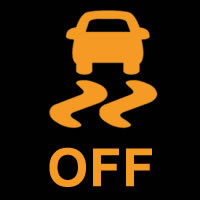Traction Control Dashboard Warning Light Meaning
The traction control warning light is one of the more common symbols that’s displayed on the dashboard. Here we answer some of the frequently asked questions about the traction control system (TCS), about the warning light and what to do if it comes on.
Traction Control Symbols
Most cars have traction control. It’ll either be a dedicated traction control system, or now more common on modern cars, it’ll be integrated into a utility that features a combination of safety and stability aids. Traction control symbols are amber in colour and the type of symbol varies. These are the symbols most often used.
| Symbol | Description |
|---|---|
 | This dedicated traction control symbol illuminates when TC is manually turned off or has a fault. |
 | A dashboard warning light question often asked is: 'What does a car with squiggly lines mean?' It's the 'Stability Control' symbol and is used frequently for many makes and models of cars. The Stability Control Program' or Dynamic Stability Control' as it's also called has various safety systems combined, traction control being one of them. |
 | ESP or Electronic Stability Program, also called ESC, or Electronic Stability Control is another combination of safety and stability systems. Traction control being part of it. Some makes and models of car may simply use the letters ESP or ESC in amber. |
 | The warning triangle in this symbol is used to warn the driver that the safety / stability program has been turned off or has a fault. |
 | Traction control and other stability programs are turned on by default during engine startup. This symbol is specifically used to inform the driver that the stability / dynamic control program has been manually switched off. |
Why is the Traction Control Light On?
There are three possible reasons why the traction control light is on:
- The traction control system has been manually switched off.
- Traction between one or more tyres and the road surface has been lost and the traction control system is actively engaged.
- If TC hasn’t been switched off, there’s is no loss of traction and the warning light is on, there’s a fault with the traction control system.
What Causes a Fault with Traction Control?
All new cars built in the EU have ABS as standard by law. ABS uses wheel speed sensors located in each wheel to measure wheel rotation speed and it’s these same sensors that are used by the traction control system.
Traction control essentially uses many other components of the anti-lock braking system (ABS) and so it stands to reason that cars fitted with ABS will either come with traction control as standard, or as a option at purchase.
ABS and traction control share the same control module, wheel speed sensors, same pump and high pressure accumulator, so you’ll often find that a fault with the ABS and traction control are related.
Though ABS / traction control sensors are very reliable, their location on the wheels subjects the hardware to potential damage and corrosion. To obtain specifics, you’ll need diagnostic equipment hooked up to read fault codes, but the likely cause of a traction control fault is:
- Broken / cracked / missing teeth on the ABS ring
- ABS sensor out of position / loss of a signal / damage from impact with road debris
- Failed pump
- High pressure accumulator that leaks or fails to hold pressure
